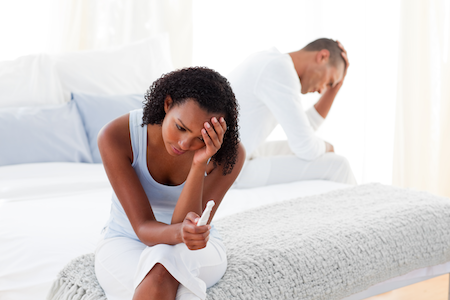
Trying to get pregnant for more than a year
Even if you're doing everything you should--taking your vitamins, staying active, logging all your data, and timing your intercourse around ovulation--many couples still have trouble conceiving. If you and your partner have been trying to conceive for at least a year (or six months for women who are over 35), it’s probably time to seek help. This doesn’t mean that you won’t ever conceive naturally, but you may benefit from a professional evaluation.
Figuring out the cause
If you and your partner have been trying to conceive for over a year without success, you’ll want to figure out whether there's a cause. If there's an underlying issue, you and your doctor will have a better idea about how to fix or work around it. Many fertility complications have safe and effective treatments. Fertility issues affect about 10-15% of couples and can occur in both men and women. Some of the most common ones include:
- Polycystic Ovarian Syndrome (PCOS): A condition of infertility caused by a combination of hormone imbalances (specifically an excess of androgens) that can cause irregular or absent ovulation. About 10% of women have PCOS, making it one of the most prevalent causes of infertilty.
- Endometriosis: A disorder in which uterine tissue grows outside of your uterus, which can cause pain, cyst development, bleeding, and scarring in the pelvic region and make it more difficult to get pregnant. Symptoms are typically most severe during your period.
- Sexually transmitted diseases or infections: Some STIs, especially if they go untreated for a while, can damage your reproductive organs and decrease your chances of conception. Untreated gonorrhea and chlamydia can lead to Pelvic Inflammatory Disease (PID), fallopian tube infections, and other problems. Luckily, they're easily treated.
- Sperm issues: Whether the quantity of sperm in semen (sperm count) is too low, their movement is restricted, or there is a problem with their shape, problems with your partner’s sperm may often account for the difficulties you're having.
- Subfertility: Even if there is no diagnosable condition, some people may simply be less fertile than others. Behavioral, genetic, and bodily differences can all affect fertility. Lifestyle choices like drinking alcohol, smoking marijuana, and being overweight can also contribute to difficulty getting pregnant, even if everything is anatomically normal.
The above conditions may cause subfertility or infertility, which can make getting pregnant more difficult. Unless they cause sterility (permanent inability to conceive), though, most couples will be able to conceive one way or another.
Read more
Sources
- "ASRM Patient Resources: Trouble Getting Pregnant?" ASRM. American Society for Reproductive Medicine, n.d. Web.
- Mayo Clinic Staff. "Infertility - Definition." Mayo Clinic. Mayo Clinic, 7/2/2014. Web.
- Li TC, Saravelos H, Chow MS, Chisabingo R, Cooke ID. "Factors affecting the outcome of laparoscopic ovarian drilling for polycystic ovarian syndrome in women with anovulatory infertility." British Journal of Obstetrics. 105:3. pg 338-44. Web. Mar-98.




